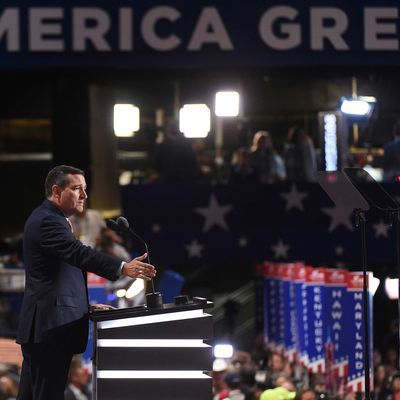
When he took the stage in Cleveland, Ted Cruz had no way of knowing that Donald Trump had given a New York Times interview repudiating America’s right even to disapprove of authoritarianism and backing away from its commitment to defend NATO allies against a Russian invasion. (“I don’t think we have a right to lecture,” Trump said of the crackdown in Turkey. “Look at what is happening in our country,” he said. “How are we going to lecture when people are shooting policemen in cold blood?”) It is not even certain that Cruz was thinking in moral terms at all. But the interview retroactively justified Cruz’s extraordinary decision to take the stage in prime-time and decline to endorse his party’s nominee, even as the boos rained down.
Trump’s foreign-policy comments symbolize the reason a significant number of Republican intellectuals have refused to endorse him. He is ignorant and has dangerous views completely outside the normal range. He does not merely repeat bizarre conspiracy theories that some Republicans believe (Barack Obama may have faked his birth certificate) or that most Republicans believe (scientists are faking global warming). He has his own set of strange beliefs. He admires dictators and may well be heavily influenced by one. Trump’s web of ties to Putin, who has a record of attempting to manipulate foreign elections, looks even more dangerous considering his green light to Russia to annex the Baltic NATO states.
In light of the risks presented by Trump, who might break the rule of law and the democratic form of government, his party has offered a strange message. Rather than tamp down the fears of what he would do, they have inflamed them. This message came through in the warm-up speakers. Former Trump business associate Phil Ruffin declared, “A tsunami is coming and his name is Donald Trump.” Florida attorney general Pam Bondi warned, “November 8 is going to be a day of reckoning.” Mike Pence’s speech accepting the vice-presidential nomination promised, “When Donald Trump is president, the change will be huge.” He sneered at Hillary Clinton as “the secretary of the status quo.”
The status quo does not sound so bad as an alternative to the election of a madman. And this, intentionally or not, formed the message of Cruz’s snub. If the Trump campaign had realized how the event would play out — booing and chaos on the floor, delegates screaming that Cruz was a traitor, and the image of disunity prevailing — they would never have given Cruz a speaking slot. Cruz may well be motivated by strategy as much as principle — he alone among the major contenders refused to endorse Trump, giving him sole ownership of what may be a large slice of the party electorate in 2020. Competitors like Marco Rubio and Scott Walker look like midgets next to Cruz now. And, to the extent nonstrategic considerations drove his decision, he may have understandably held a grudge against Trump’s petty insults against him, his father, and wife.
But Cruz’s speech will instead symbolize something else: the refusal of an educated, professional politician to risk handing executive power to the most dangerous figure ever to have a chance to obtain it in the history of the United States.






























